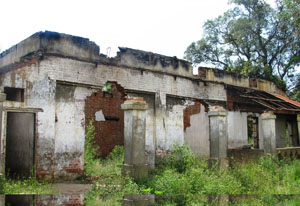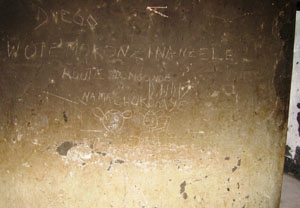
FARADJE, Democratic Republic of the Congo — Almost a year after the brutal attacks of Christmas 2008, the people of Faradje in northeastern Congo are trying to cope with the terror perpetrated by the Lord’s Resistance Army. A psychiatrist employed by an international NGO said that many, especially children, will probably be scarred for life by the horrible events that took place just over a year ago.
Faradje was the epicenter of a brutal LRA attack on December 25, 2008. The attackers entered the town at night, burning houses, killing, raping, and pillaging. The day after the attack, 143 people were dead and 160 kidnapped. Many of those who were kidnapped have not returned and are feared dead.
The devastation is still clear for everyone to see. Many houses burned by the LRA have not been restored and now stand as permanent reminders of the horrors of that day. “A great number of our congregation cannot afford to rebuild their houses,” said a local priest. “Many do not want to come back to places where they lost entire families,” he added.
The threat of LRA attacks has significantly diminished in the past six months, as those responsible for the attack against Faradje and nearby Nagero have surrendered to the Ugandan army. Colonel Charles Arop, who was in charge of the 70 strong LRA group that attacked Faradje and Nagero, surrendered to the Ugandan soldiers in Djabir, 10 km from Farajde. Almost all of Arop’s 70 fighters have either given themselves up or have been killed. Only two days ago, the last remaining LRA troops thought to be operating near Faradje, a group of four led by Captain Ochen, also surrendered. The rest of the LRA seemed to have moved either north to the Central African Republic or further west to the Congolese region of Bas Uele.
But the population of Faradje is not quite yet at peace. Congolese soldiers sent to Faradje to protect civilians from LRA attacks have mounted a campaign of looting, beating, and intimidating the locals. Congolese soldiers, who are notoriously underpaid and underfed, have turned to the local population to secure food, mostly by force.
The most egregious and frequent cases take place in road checkpoints manned by the Congolese army, where soldiers forcefully exact ‘taxes’ or steal peoples’ possessions. In a recent case being quietly discussed around town, three Congolese soldiers reportedly asked a civilian to use his bike to transport meat of an elephant the soldiers had illegally shot. When the man refused, the soldiers beat him up and left him for dead. The soldiers then shot in the air and said that the man had been killed by the LRA, but the civilian came to his senses and recounted his story. It is unclear whether the soldiers were ever punished, despite protests from the local population.


